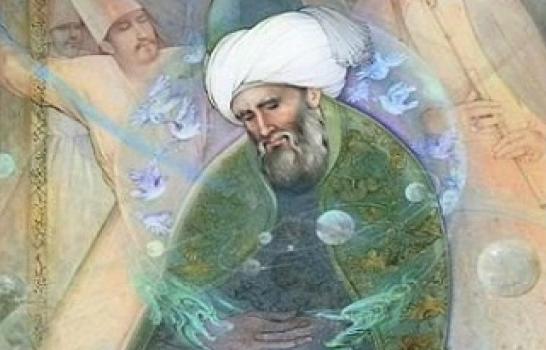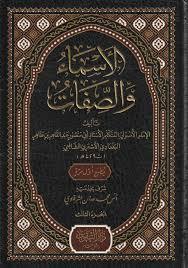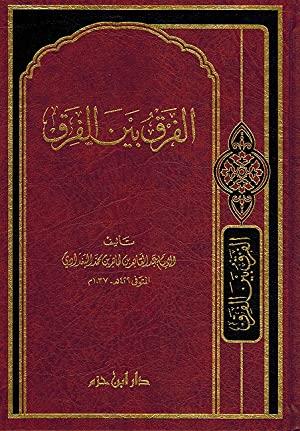Abdul Qahir al-Baghdadi is an Iranian writer and jurist and the author of the book Al-Farq and Al-Farq

 Abdul Qahir Baghdadi
Abdul Qahir BaghdadiAn abstract of Abdul Qahir Baghdadi's biography:
Full name: Abu Mansour Abdul Qahir bin Taher bin Muhammad Baghdadi
Date of birth: 980 AH
Place of birth: Baghdad
Residence: Neishabur
Profession: Iranian writer and jurist
Education: literature and jurisprudence
Works: “Asul al-Din”, “Mallal wa al-Nahl”, “Al-Farq Bin Al-Farq” and…
 Biography of Abdul Qahir Baghdadi
Biography of Abdul Qahir BaghdadiBiography of Abdul Qahir Baghdadi:
Abu Mansoor Abdul Qahir bin Tahir bin Muhammad Baghdadi was born in 980 AH in Baghdad. He went to Neishabur with his father and settled there. Since Baghdadi was from the Tamim tribe, he was also called Tamimi.
Both Baghdadi and his son were known for their good manners and generosity. It has been said that Abd al-Qahir gave away all his wealth in the cause of science, that's why he became involved in poverty.
Since Abdul Qahir was very interested in learning techniques and sciences, he was able to master several fields including jurisprudence, theology, arithmetic, literature and hadith and then teach them.
Professors Abdul Qahir Baghdadi:
The professors of Abdul Qahir are people like; Abu Ishaq Ibrahim bin Muhammad Esfraini was a Shafi'i jurist and an Ash'ari theologian. His other professors in mathematics are not mentioned. People like Abu Amr bin Najid, Abu Amr Muhammad bin Jafar bin Matr, Abu Bakr Ismaili and Abu Ahmad bin Adi listened to hadiths, and Bayhaqi and Abdul Ghafar bin Muhammad bin Shirwayh narrated hadiths from this jurist.
Students of Abdul Qahir Baghdadi:
Some have claimed that most of the elders and intellectuals of Khorasan were among the students of Abd al-Qahir, among whom we can mention Nasser Marozi and Abul Qasem Qoshiri.
Baghdadi's presence in Neishabur:
When Abdul Qahir lived, Neishabur was considered one of the big cities of Khorasan and one of the most prosperous commercial and agricultural centers. due to the political stability of the Ghaznavid era; Neishabur had become a cultural center for the gathering of people of different opinions. Also, Hanafi and Shafi'i, Karamiya, Alevi and Ismaili jurists, Sufis had stepped into the field, some of them were people of the book. Most of the scholars and elders of the city belonged to noble families.
Baghdadi's scientific position:
The only information that is available from Baghdadi is related to al-farq bin al-farq, according to which Abu Mansur debated with one of the distinguished theologians named Ibrahim bin Muhajir in the presence of Naser al-Dawlah Abu al-Hassan Simjur, the commander of the Samanian army, in 370.
Considering the influence of Karamiya, this shows the scientific dominance of Abdul Qahir.
Areas of expertise of Abdul Qahir Baghdadi:
Baghdadi is important in two ways, including:
Immersion in arithmetic
Skill in nations and palmistry or cultology
The book of difference between differences:
Baghdadi has written two books in the field of sectarianism with the names of al-Farq between al-Farq and Al-Mall and al-Nahl. The book Farq after Farq al-Shia Nobakhti and Essays al-Islamiyin Ash'ari are among the oldest and most comprehensive works in this field.
According to Fakhr Razi, Shahristan, who wrote his Mills and Nahal based on Baghdadi's differences, was not far from bias in quoting the opponents' statements as it should be.
The division of sects in the book of Abdul Qahir Baghdadi:
Baghdadi based on the hadith of the division of the nation after the Prophet; He has divided the sects and according to the precedence and delay of the incidents and events, he mentions the differences of opinion but does not mention the historical roots. In addition to this issue, one cannot ignore his social conditions in confronting Karamiya's ideas:
He and Abu Ishaq Esfraini and Ibn Fourak, Ash'ari theologians and hadith scholars, have used metaphors and majaz to explain the divine attributes, in contrast to the Ash'ari and Baghalani methods, in the face of Karamiyyah's allegorical ideas. Al-Malla wa al-Nahl, edited by Nader Al-Bransari, is a summary report of his book Farq Bin Farq.
Fifteen pillars of belief according to Abdul Qahir Baghdadi:
In the book Al-Farq bein Al-Farq, Baghdadi refers to the same 15 pillars of belief as stated in the principles of religion as the common beliefs of Ahl al-Sunnah and Jamaat, which is the savior sect.
These pillars include proof of facts and sciences; the occurrence of the world; Knowledge of God as the creator of the world; His inherent, eternal attributes, his names and attributes; His justice and wisdom; Prophets, their miracles and…
 The book Farq Bin Farq by Abdul Qahir Baghdadi
The book Farq Bin Farq by Abdul Qahir BaghdadiAbdul Qahir Baghdadi's emphasis on Shafi'i jurisprudence:
It can be seen in all Baghdadi's works on Shafi'i jurisprudence. Like other Shafi'is, he prefers his jurisprudence over Hanafi jurisprudence and considers it more original and closer to the Sunnah of the Prophet, he even wrote a poem mocking Abu Hanifah.
Abdul Qahir Baghdadi's tendency towards Sufism:
Baghdadi was also interested in Sufism and approved of it, he mentioned the Sufis and their elders in the difference between al-Furq and Usul al-Din in the classification of scholars and sects of Ahl al-Sunnah and Jamaat and compared their method to trust, contentment and negation. and accepts the dignity of parents. Among the thousand mystics mentioned in Tabaqat, he identifies Sufi Abd al-Rahman Sulami as one of the top three Sunnis.
Theological works of Abdul Qahir Baghdadi:
Among the other theological books of Baghdadi, we can mention Fadaeh al-Karamiyyah, which is strongly opposed to Karamiyyah, although it cannot be determined whether the book was written during the peak of his power or after its decline.
This book of Baghdadi is mentioned in the work Al-Farq al-Farq: Negation of Khalq al-Qur'an; attributes; Faith and principles; Abolition of birth; Nasakh and al-Mansukh (in the collection of Berlin manuscripts); The scandals of the Mu'tazila, the summary of which is given in Al-Farq; Al-Madi's maturity on the principles of Al-Hudi.
The jurisprudential and hadith works of Abdul Qahir Baghdadi:
Apart from the book of Tafsir, we can refer to his jurisprudential and hadith works, which include: interpretation similar to Al-Akhbar-e Valayat; Graduated in principles of jurisprudence; Al-Emad is in the inheritance of Al-Abad. Sabaki considered this book to be unique in terms and calculations; Description of Ibn Al-Qas Miftah; Al-Durriyat fi al-Taharat and other jurisprudential chapters of which Asnawi had a copy with him; Abu Abdullah al-Jarjani's violation of our preference for the religion of Abi Hanifa.
Mystical works of Abdul Qahir Baghdadi:
Among the mystical works of Baghdadi, we can mention Ali al-Ghani's al-Shakir's Tafzil al-Faqeer al-Sabir. A variant of Ibn Salah says that Baghdadi wrote a book about Sufism and in it he collected a thousand sayings in alphabetical order.
Mathematical works of Abdul Qahir Baghdadi:
Baghdadi has left two math books:
Al-Takmala Fi Al-Ashbat:
This book is written in Arabic and there is a manuscript of it in the Central Library of Tehran University. There is another copy of this book in Cairo. The Arabic text of this book, along with its introduction and appendices, has been published by Ahmad Salim Saidan. Of course, an incomplete copy is kept in the Lale Li Library in Istanbul.
The works of Abdul Qahir Baghdadi:
Usul al-Din or al-Tasra al-Baghdadiyya
Al-Aydah on the principles of making the eraser
The difference between the differences: deals with the difference of theological tendencies among Muslims. This book was translated by Dr. Mohammad Javad Mashkoor and was published in 1333.
Al-Malla and Al-Nahl: in expressing the opinions of the theological sects in the Islamic world
Nasakh and al-Mansukh: About the concept and conditions of abrogation, and the abrogated and abrogated verses of the Qur'an.
compilation: Cover biographical section






